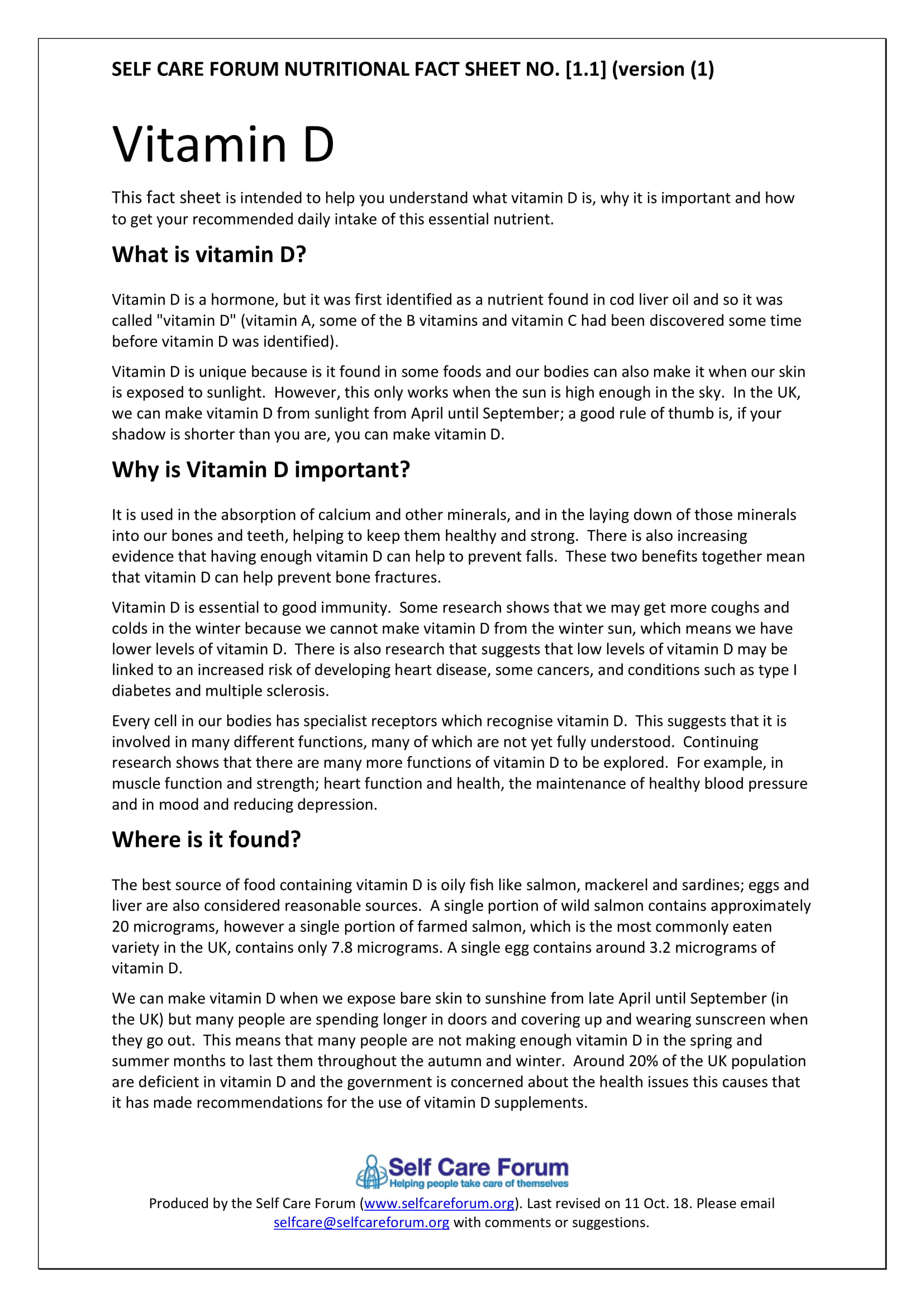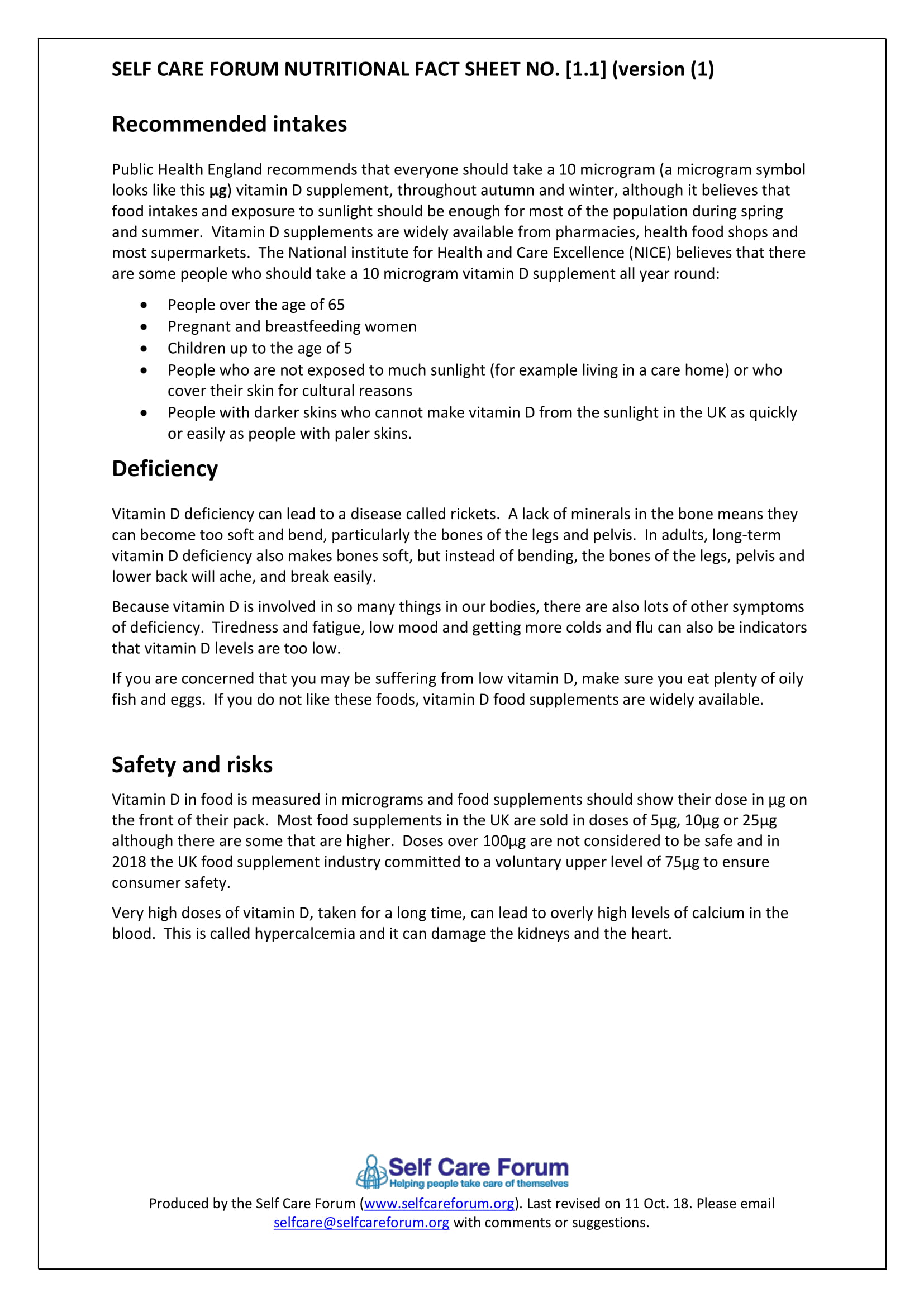Vitamin D helps regulate the amount of calcium and phosphate in the body.
These nutrients are needed to keep bones, teeth and muscles healthy.
A lack of vitamin D can lead to bone deformities such as rickets in children, and bone pain caused by a condition called osteomalacia in adults.
Good sources of vitamin D
From about late March/early April to the end of September, most people should be able to get all the vitamin D they need from sunlight. The body creates vitamin D from direct sunlight on the skin when outdoors.
But between October and early March we don’t get enough vitamin D from sunlight.
Vitamin D is also found in a small number of foods.
Sources include:
•oily fish – such as salmon, sardines, herring, mackerel and fresh tuna
•red meat
•liver
•egg yolks
•fortified foods – such as most fat spreads and some breakfast cereals
Another source of vitamin D is dietary supplements.
In the UK, cows’ milk is generally not a good source of vitamin D because it isn’t fortified, as it is in some other countries.
How much vitamin D do I need?
Babies up to the age of one year need 8.5-10mcg of vitamin D a day.
Children from the age of one year and adults need 10mcg of vitamin D a day. This includes pregnant and breastfeeding women, and people at risk of vitamin D deficiency.
From about late March/early April to the end of September, the majority of people should be able to get all the vitamin D they need from sunlight on their skin.
Should I take a vitamin D supplement?
Advice for infants and young children
The Department of Health recommends that:
•breastfed babies from birth to one year of age should be given a daily supplement containing 8.5-10mcg of vitamin D to make sure they get enough
•formula-fed babies shouldn’t be given a vitamin D supplement until they’re having less than 500ml (about a pint) of infant formula a day, as infant formula is fortified with vitamin D
•children aged 1-4 years old should be given a daily supplement containing 10mcg of vitamin D
You can buy vitamin D supplements or vitamin drops containing vitamin D (for under fives) at most pharmacies and supermarkets.
Women and children who qualify for the Healthy Start scheme can get free supplements containing the recommended amounts of vitamin D. See the Healthy Start website for more information. https://www.healthystart.nhs.uk/
Advice for adults and children over 5 years old
During the autumn and winter, you need to get vitamin D from your diet because the sun isn’t strong enough for the body to make vitamin D.
But since it’s difficult for people to get enough vitamin D from food alone, everyone (including pregnant and breastfeeding women) should consider taking a daily supplement containing 10mcg of vitamin D during the autumn and winter.
Between late March/early April to the end of September, most people can get all the vitamin D they need through sunlight on their skin and from a balanced diet. You may choose not to take a vitamin D supplement during these months.
People at risk of vitamin D deficiency
Some people won’t get enough vitamin D from sunlight because they have very little or no sunshine exposure.
The Department of Health recommends that you take a daily supplement containing 10mcg of vitamin D throughout the year if you:
•aren’t often outdoors – for example, if you’re frail or housebound
•are in an institution like a care home
•usually wear clothes that cover up most of your skin when outdoors
People with dark skin from African, African-Caribbean and south Asian backgrounds may also not get enough vitamin D from sunlight. They should consider taking a daily supplement containing 10mcg of vitamin D throughout the year.
What happens if I take too much vitamin D?
Taking too many vitamin D supplements over a long period of time can cause too much calcium to build up in the body (hypercalcaemia). This can weaken the bones and damage the kidneys and the heart.
If you choose to take vitamin D supplements, 10mcg a day will be enough for most people.
Don’t take more than 100mcg of vitamin D a day as it could be harmful. This applies to adults, including pregnant and breastfeeding women and the elderly, and children aged 11-17 years.
Children aged 1-10 years shouldn’t have more than 50mcg a day. Infants under 12 months shouldn’t have more than 25mcg a day.
Some people have medical conditions that mean they may not be able to safely take as much. If in doubt, you should consult your doctor.
If your doctor has recommended you take a different amount of vitamin D, you should follow their advice.
Your body doesn’t make too much vitamin D from sun exposure, but always remember to cover up or protect your skin if you’re out in the sun for long periods to reduce the risk of skin damage and skin cancer.


Link to the selfcareforum.org website information on Vitamin D (printable) http://dev.selfcareforum.org/wp-content/uploads/2018/10/Vitamin_D_01.1_without_references.pdf
